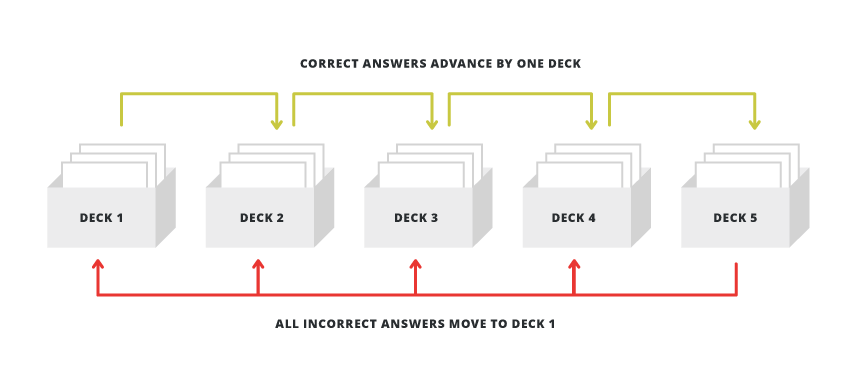Hack GRE Vocab: Use Spaced Repetition to Get Maximum Results with Minimum Time Investment

Did you know that you can attend the first session of any of our online or in-person GRE courses absolutely free? We’re not kidding! Check out our upcoming courses here.
Your time is a limited commodity. Studying GRE vocab can be tedious and time-consuming, and worst of all…inefficient.
If you’re like most students, you flip through flashcards (either pre-made or hand-made) and quickly try to remember what was on the back. After a few dozen repetitions over a few weeks you probably remember many of them. But…you don’t retain that information for long, and you might not recognize the words when used in a slightly different context.
Vocabulary is a significant component of GRE Verbal, but it’s not actually something that you should invest a significant portion of your time into studying! That’s because there’s no way to determine which words you’ll see on test day—you might see a dozen of the words you studied, or you might not see any at all.
So, you want to learn as many GRE vocab words as you reasonably can between now and test day with the minimum time spent studying!
The Power of Forgetting
It’s a waste of time to study the same GRE vocab word every single day. That word will still be there in your short-term memory from the day before, but you can’t be sure that you’ve actually converted it into a long-term memory.
Letting yourself almost forget something before you recall it—the “it’s on the tip of my tongue!” feeling—actually strengthens neural connections. As Gabriel Wyner, author of Fluent Forever, explains:
Memory tests are most effective when they’re challenging. The closer you get to forgetting a word, the more ingrained it will become when you finally remember it.
So, don’t study that same GRE vocab word every day. You want to space out how often you see it to maximize your ability to ultimately remember it.
Without any review, we forget most of what we learn:

But if we review at spaced intervals—just before we would have forgotten—we change that curve completely:

How to Space Out Your Studying
First, get organized. Create a set of 5 index card boxes (or piles, or folders, or whatever works for you).

Directions:
- Make a memorable flashcard, then place it in Deck 1.
- Quiz yourself on Deck 1 words every day.
- If you get a word right, move it to Deck 2.
- When you quiz yourself on Deck 2, any that you get right move to Deck 3.
- Any that you get wrong—from any deck—you move back to Deck 1.
- If you’ve moved a card back to Deck 1 more than once, you have to improve your definition: Add a new personalized sentence, rhyme, picture, etc.
- Once you get a word right in Deck 5, you’ll (ideally) remember it forever!
Create a Study Calendar
You’ll need to stay organized to know which GRE Vocab decks to study on which days. Here is an example:

Can I Do This Online?
Yes! If you’re too tech-savvy for the pen-and-paper method, there are websites & apps with algorithms that create this same spacing effect. Here are some free ones that I recommend:
The principles will be the same whether you use an app or make your own physical study toolbox.
How This Helps
Okay, yes. It takes extra time to organize all of this, and to keep track of what you’re reviewing when. But after that initial investment of a little bit of extra time, you’ll save yourself a lot of time in the long run. After you’ve reviewed a card 5 times (or maybe a few extras if you have to return it to Deck 1), you’ll know it forever! Rote memorization, on the other hand, usually takes twice as many repetitions.
More importantly, though, spacing out your study is more effective at convert short-term memories into long-term memories. This will do more to ensure that you actually remember the GRE vocab words on test day.
And bonus—you just might retain an impressive vocabulary for the rest of your life! ?
Want more guidance from our GRE gurus? You can attend the first session of any of our online or in-person GRE courses absolutely free! We’re not kidding. Check out our upcoming courses here.
 Céilidh Erickson is a Manhattan Prep instructor based on New York City. When she tells people that her name is pronounced “kay-lee,” she often gets puzzled looks. Céilidh is a graduate of Princeton University, where she majored in comparative literature. After graduation, tutoring was always the job that bought her the greatest joy and challenge, so she decided to make it her full-time job. Check out Céilidh’s upcoming GMAT courses (she scored a 760, so you’re in great hands).
Céilidh Erickson is a Manhattan Prep instructor based on New York City. When she tells people that her name is pronounced “kay-lee,” she often gets puzzled looks. Céilidh is a graduate of Princeton University, where she majored in comparative literature. After graduation, tutoring was always the job that bought her the greatest joy and challenge, so she decided to make it her full-time job. Check out Céilidh’s upcoming GMAT courses (she scored a 760, so you’re in great hands).